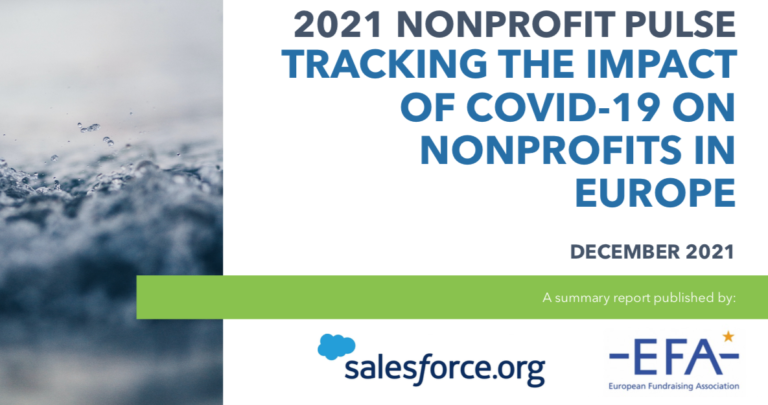2021 sees income rise for nonprofits in Europe but pressures on staff deepen

Charitable income is on the rise in Europe with nonprofits continuing to adapt and innovate to overcome the challenges of the pandemic, according to a new European Fundraising Association and Salesforce.org report.
Based on a survey of 480 nonprofit representatives in Europe, 23% of which are in the UK, the 2021 Nonprofit Pulse Report reveals that 2 in 3 respondents expect their total income in 2021 to exceed or match income from last year.
Nonprofits in Netherlands and Spain are most optimistic about income growth, while Ireland, Germany and UK are less positive. In the UK, 43% expect income to be either slightly or much higher than 2020, and 33% slightly or much lower.
Advertisement
Although half of the 480 respondents had to cancel or postpone fundraising activities during the year, many also innovated in response with 7 in 10 increasing their use of digital to reach and engage supporters. More than 2 in 5 respondents reported a rise in individual giving, with 1 in 4 saying donation levels were stable.
And, as demand for services continues to rise and social distancing restricts face-to-face outreach, 55% have developed new ways to deliver their mission and reach beneficiaries.
Increased workloads and pressure
However, the report also found concerns across Europe about rising workloads and increased pressure on nonprofit staff. When asked to identify the biggest challenges facing their nonprofit now, the ability to manage workload topped the list, cited by more than half of respondents (52%), rising to 62% of respondents in the UK and Ireland. 4 in 10 report that staff and volunteers are more stressed than they were pre-pandemic, rising to 48% in the UK.
Eduard Marček, former President of the European Fundraising Association and Head of the Slovak Fundraising Centre, said:
“Nonprofits have proved themselves to be hugely resilient and agile, but this cannot come at the expense of the sector’s workforce; the people who work so hard to protect good causes and the most vulnerable communities around us.
“Remote working, reduced staff and volunteer capacity, restricted budgets and higher demand for services are all adding to the challenge of managing workload in an ever-changing environment.
“The biggest challenge ahead of us now surely is not only how to survive and thrive through the next phase of the pandemic, but how best to support and nurture our people and ease workloads. It’s no easy feat but protecting our people has never been more important.”
Emphasis on supporter relationships
A renewed focus on relationship building and supporter care has also been seen across Europe. Half of respondents say they are increasing their focus on supporter retention, and 1 in 3 say their supporter relationships have strengthened during the pandemic.
Commenting on the findings, Ceri Edwards, Director of People & Engagement at the Chartered Institute of Fundraising and Vice President of EFA, said:
“These findings are a fascinating snapshot of the impact on fundraising across Europe during 2021. It’s clear that the pandemic continues to place challenges on fundraisers all over the continent and is transforming fundraising strategies for the longer-term, especially with the increased focus on digital and opportunities of online events and new channels. While it is encouraging that income for charities is increasing and that fundraising is recovering compared to 2020, significant challenges remain.
“From the UK perspective, it’s concerning that respondents are most likely to say that they have bigger workloads and that staff are more stressed. We need a fundraising workforce that is energised and healthy to be able to raise the funds that our causes need, and the Chartered Institute of Fundraising will be working with its members to develop the right tools, support and training to achieve that.”
More on fundraising since the start of the pandemic
Fundraising beyond lockdown: a round up of useful research May 2021




